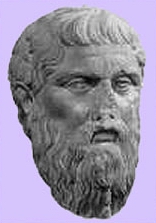 Major Ideas
Major Ideas
– Educated persons are skilled in the art of rhetoric, which enables them to articulate thought with clarty and superior argumentation.
– What enables one to lead others can be taught.
– No one is absolutely self-sufficient, for human survival depends on mutual cooperation in society – hence the importance of values, communication, and laws.
– Because all have a basic need for self-preservation, all have the obligation to participate in the governance of the community.
– Man in the measure of all things: Perception and truth are related to the experience and judgment of the individual.
– One cannot with certainty either affirm or reject the existence of the gods.
Biography
Protagoras of Abdera was one of several fifth century Greek thinkers (including also Gorgias, Hippias, and Prodicus) collectively known as the Older Sophists, a group of traveling teachers or intellectuals who were experts in rhetoric (the science of oratory) and related subjects. Surprising little is known of Protagoras’ life with any certainty. Our main sources of information concerning Protagoras are:
Plato (427-347 BC): Protagoras is a leading character in Plato’s dialogue Protagoras and Protagoras’ doctrines are discussed extensively in Plato’s Theaetetus. Plato’s dialogues, however, are a mixture of historical account and artistic license, much in the manner of the comic plays of the period. Moreover, Protagoras died when Plato was quite young and Plato may have depended on not entirely reliable second-hand evidence for his understanding of Protagoras.
Diogenes Laertius (3rd century BC): Diogenes’ Lives of the Philosophers is probably our single most extensive source for many early Greek philosophers’ works and biographies. Unfortunately, his work was compiled over six hundred years after Protagoras’ death and is an uncritical compilation of materials from a wide variety of sources, some reliable, some not, and many hopelessly garbled
Sextus Empiricus (late 2nd century BC): Sextus Empiricus was a skeptic of the Pyrrhonian school. Sextus wrote several books criticizing the dogmatists (non-skeptics). His treatment of Protagoras is somewhat favorable, but since his purpose is to prove the superiority of Pyrrhonism to all other philosophies,we cannot trust him to be “objective” in a modern sense; moreover, like Diogenes, he wrote several hundred years after Protagoras’ death and may not have had completely reliable sources.
The first step in understanding Protagoras is to define the general category of “sophist,” a term often applied to Protagoras in antiquity.
In the fifth century, the term referred mainly to people who were known for their knowledge (e.g. Socrates, the seven sages) and those who earned money by teaching advanced pupils (e.g. Protagoras, Prodicus) and seemed to be a somewhat neutral term, although sometimes used with pejorative overtones by those who disapproved of the new ideas of the so-called “Sophistic Enlightenment”.
By the fourth century the term becomes more specialized, limited to those who taught rhetoric, specifically the ability to speak in assemblies or law courts. Because sophistic skills could promote injustice (demagoguery in assemblies, winning unjust lawsuits) as well as justice (persuading the polis to act correctly, allowing the underprivileged to win justice for themselves), the term “sophist” gradually acquired the negative connotation of cleverness not restrained by ethics.
Conventionally, the term “Older Sophist” is restricted to a small number of figures known from the Platonic dialogues (Protagoras, Gorgias, Prodicus, Hippias, Euthydemus, Thrasymachus and sometimes others). Whether these figures actually had some common body of doctrines is uncertain.
At times scholars have tended to lump them together in a group, and attribute to them all a combination of religious skepticism, skill in argument, epistemological and moral relativism, and a certain degree of intellectual unscrupulousness. These characteristics, though, were probably more typical of their fourth century followers than of the Older Sophists themselves, who tended to agree with and follow generally accepted moral codes, even while their more abstract speculations undermined the epistemological foundations of traditional morality.
When we separate Protagoras from general portraits of “sophistic”, as most scholars (e.g. the ones listed below in the bibliography) recommend, our information about him is relatively sparse.
He was born in approximately 490 BC in the town of Abdera in Thrace. He traveled around Greece earning his living primarily as a teacher and perhaps advisor and lived in Athens for several years, where he associated with Pericles and other rich and influential Athenians.
Pericles invited him to write the constitution for the newly founded Athenian colony of Thurii in 444 BC Many later legends developed around the life of Protagoras which are probably false, including stories concerning his having studied with Democritus, his trial for impiety, the burning of his books, and his flight from Athens.
Protagoras is known primarily for three claims:
(1) that man is the measure of all things (which is often interpreted as a sort of radical relativism)
(2) that he could make the “worse (or weaker) argument appear the better (or stronger)”, and
(3) that one could not tell if the gods existed or not.
While some ancient sources claim that these positions led to his having been tried for impiety in Athens and his books burned, these stories may well have been later legends. Protagoras’ notion that judgments and knowledge are in some way relative to the person judging or knowing has been very influential, and is still widely discussed in contemporary philosophy.
Major Works of Protagoras
– On Truth
– On the Gods

 Major Ideas
Major Ideas
You can definitely see your skills in the work you write. The world hopes for even more passionate writers like you who are not afraid to say how they believe. Always go after your heart.